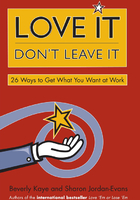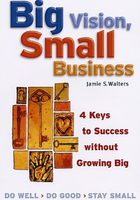Leading Differently
Pamela and I talk regularly about the pioneers of values-based business. The members of our network have invented brand-new models, new structures, new forms of leadership, and new ways to serve all stakeholders. But the toughest piece of all is the development of the values-based leader. It's something you learn to become over the course of a lifetime.
DEB NELSON, CO-EXECUTIVE DIRECTOR WITH PAMELA CHALOULT, SOCIAL VENTURE NETWORK
True to Yourself is a practical guidebook of strategies, programs, and policies that work for values-based small business leaders. Its intention is to accelerate your learning and help you avoid mistakes to make your job easier, your company more successful, and your life more fulfilling. Its purpose is to make your dreams come true.
But you can't do it alone. The central theme is that, paradoxically, to reach your dreams you must help other people reach their dreams. Your key task is to design an organization that helps the people you impact do just that—reach their personal dreams—which in turn will lead to your organization's success and the realization of your dreams. At the core of leadership, therefore, is the hard work of building the soft skills necessary to develop and sustain those relationships.
The Challenge of Values-Based Leadership
Being a values-based leader is a destiny, not a destination. So why did you decide to become a business leader, much less a values-based leader running a small enterprise where social and financial objectives may conflict daily and one mistake can be fatal? To illustrate my point, let me offer three potential conflicts:
How do you negotiate price with a minority supplier whose business you want to support?
How do you lower production costs when it will require that you replace people with machines?
How do you maintain an effective, collaborative culture with women in leadership positions when several of the men don't like working for women?
After leaving Harvard in 1988, I faced these three challenges in my start-ups. I could list 100 more. Some I navigated well these past eighteen years; some I did not. The third conflict ruined our culture in one start-up and caused me to sell that company.
I learned that being a values-based leader is not about making one big decision at a critical time. It's about making lots of smaller daily decisions—decisions that may seem incidental but that are actually fundamental to your success. Each can affect many people, strengthening or weakening important relationships. It's also frequently about how decisions are made as much as what the decision is. It sounds great to say you want every decision to be values based. But try doing it!
Values-based leaders consider the financial, social, environmental, and even spiritual impact of their decisions. So when I use the word “values,” I mean standards of behavior for helping people and healing the planet. I mean being concerned with people not only in your company but also beyond your business and immediate self-interest. And I'm pretty stubborn about it. If you can't build a business that leads to a better world for all in some small way, then why build a business at all? The challenge, of course, is how.
Leadership is lonely. Leadership is hard. Values-based leadership is even lonelier and harder. Few may understand your methods or reasoning. When you say you're “values-based,” you put yourself under increased scrutiny. You also need more patience, tenacity, and self-confidence to incorporate your values into a financially successful business. In my case, I knew that to do that, I needed help.
Social Venture Network: Creating a More Just and Sustainable World
When I stumbled upon Social Venture Network (SVN) in 1989, it was like a breath of fresh air. I was introduced to venture philanthropist Josh Mailman, who along with the chair of Calvert Group, Wayne Silby, founded SVN two years earlier. A standing joke in those days was that when anyone was asked, “How did you learn of SVN?” or “How did you get in [to SVN]?” the oneword answer was always “Josh.” Josh was everywhere, meeting everyone and supplying the funds and the energy to do whatever needed to be done for SVN to be successful.
Since 1989, we've been meeting at U.S. conferences twice a year and have added regional get-togethers and conferences around the world. SVN has also been the incubator for other successful networks for large businesses, local businesses, MBAs, investors, and inner-city organizations. But our fundamental question remains the same: How can we as business leaders be a force for social change—while running companies that are financially healthy as well?
At my first conference, I was like a kid in a candy store with all these incredible people to meet! Still, I felt that I was the only one stupid enough to leave a good job to try to change the world with a small business. To my surprise, I met CEOs, executive directors, and visionary thinkers who had a similar life course. Though we were doing different types of work, I like to say that we had many heads but one heart.
We shared our business and personal challenges. Some individuals were doing well financially but felt their companies had not contributed enough to society. Others were making a large social contribution but could not get their economics to work.
The SVN get-togethers helped us learn from each other how to marry these worlds of private gain and social good and how to become more personally fulfilled as effective values-based leaders. We also had a shoulder to cry on when things didn't work out. We began what have become long-term relationships—critical to long-term leadership success—within the SVN membership and beyond.
I recognized that our conversations were different from the ones I had during the first part of my career. We were discussing the power of leadership and of business as the power to serve. I instinctively knew that these leaders think, act, and react differently in dozens of small but significant ways. I felt at home: good-bye loneliness, good-bye problems! Well, not exactly. Remember, you need patience.
The Process of Leading Differently
With seventeen years as an SVN member, membership in several other values-based fellowships of leaders, and my experience as a values-based leader and writer, I was asked to write a book about this brand of leadership. SVN co-executive director Deb Nelson and I put together a list of eighty-five members to interview. We expected twenty-five responses but received seventyfive. After the deadline, we heard from another five members whom I didn't interview. This 94 percent response tells you a lot about these people and their commitment.
Each interview was conducted over the phone for forty-five minutes with open-ended questions. I then wrote up a 174-page draft of the 75 interviews (66 percent/34 percent profit/nonprofit, 60 percent/40 percent male/female, 11 percent leaders of color). The interview draft, my experience, and previous talks with values-based leaders provided the data for this book.
True to Yourself is the practical guide to what to do Monday morning at the office that I wish I had back in 1988. It's not a book about the leaders interviewed. Their stories and quotes are used to support and illustrate the advice given. While some of their perspectives on leadership may sound familiar, I want to emphasize how these leaders simply think and act differently regarding the purpose of their businesses. For example, I'll never forget sitting next to Bruce Katz in April 1990 as a new SVN member, Anita Roddick of the UK-based Body Shop, was preparing to address 300 of us. Bruce had recently sold Rockport Shoes to Reebok International, Ltd. He had started the “Walking Movement” and had a positive social impact in many ways. He also had made a fortune. I was thinking, who am I to be sitting next to this guy?
We were hoping Anita wouldn't talk about the Body Shop's products, shampoo and toiletries. We were hoping she wouldn't bore us. She strode on stage with the message that “nobody dreams of selling shampoo all their life. We all dream of noble purposes.” She lowered the lights and up came a video.
We were transported to Berlin, Germany. It was November 1989 and the Wall was coming down. Before we could blink, the video moved to Body Shop employees going into Eastern Europe with relief efforts—helping out in orphanages, painting social service buildings. We could feel their joy. What an opportunity to serve!
The video ended and the lights came on. Most of us were speechless. Anita had not said one word about her products. She had blown us away instead. Bruce looked at me and asked, “What have I been doing with my life?”
Pioneers like this master campaigner injected a contagious enthusiasm that broadened our perspectives on what a business leader could do. Anita filled us with a positive energy that we'd bring back to our companies after the conference.
The maturity of the values-based business movement—a coming of age, if you will—was reflected in the interviews conducted for this book. While inspired by social activist CEOs like Anita Roddick, many of the movement's leaders have strong business backgrounds. They impose the discipline of business on how they integrate social values into their companies. They are the soul of this book: this “new wave” of values-based small business leaders has taught me how to become true to myself.
[These pioneers] don't set out to change the world; they set out to change their worlds. And in so doing, they often change the way one person or a few people or whole communities or entire nations or the world thinks and operates in some significant way.
ANITA RODDICK, THE BODY SHOP
The Solution: Between These Covers
This book is divided into seven chapters. Chapters 1 and 2 provide a foundation for the five values-based leadership practices discussed in chapters 3 through 7. I conclude with a summary of the key to-dos for a values-based small business leader.
Chapter 1, “The New Values: Transparency, Sustainability, and Responsibility,” addresses the strategic requirements of a values-based business leader. Specifically, I replace former General Electric CEO Jack Welch's three levers of business value— reputation, productivity, and regulation—with three new levers that will transform your job.
In chapter 2, “The Three Cs: Competence, Compassion, and Commitment,” I argue that these three personal characteristics are essential for every strong values-based leader. All are required to build strong long-term relationships—the heart and soul of the work of leadership. I define these character attributes and discuss the importance of developing and modeling them for the entire organization.
Chapters 3 through 7 present the five most important leadership practices I've distilled from personal experience, reinforced by the interviews. The five practices progress from personal leadership to organizational leadership to industry-wide and potentially global leadership: (1) turn your values into value, (2) walk toward the talk, (3) communicate with care, (4) facilitate personal growth, and (5) collaborate for greater impact. Each chapter focuses on specific actions for becoming a more effective values-based leader.
All five chapters are organized similarly. After giving a brief overview of the chapter and its goal, I discuss the importance of a specific practice. Next I offer three myths about that practice, supported by counterexamples based on my experience and that of the interviewees. I then give an example of how to do it effectively and on how not to do it, followed by a set of questions designed to help you improve in the practice. Each chapter concludes with an action exercise so you can practice what you've learned, as well as a summary of the chapter's main points.
Chapter 3, “Turn Your Values into Value,” starts with you. It outlines the process of leading from who you are and what you care about to create a “best in class” business.
In chapter 4, “Walk Toward the Talk,” I examine what's often the most difficult job: building an internal culture that reflects your values.
“Communicate with Care” is the subject of chapter 5. When you're a values-based leader, everything you say and do—and don't say and don't do—whether you're at work or not, communicates your values to people. I discuss how to increase your sensitivity to what and how you communicate. I use what may seem to be small, but significant, practical reminders to help you maintain the delicate balance of power and responsibility.
Chapter 6, “Facilitate Personal Growth,” acknowledges that values-based leaders are agents of transformation, a difficult task that typically faces substantial resistance. I argue that leadership is about changing people's behavior, which is done most effectively by appealing to individual feelings and emotional needs.
In chapter 7, “Collaborate for Greater Impact,” I make the case that whereas internal collaboration is important, external collaboration may be even more important to building a business with significant impact. This opportunity, however, requires that you redefine your business and reassess how your time is spent.
I conclude with a review of the major themes in a summary chapter, “Leadership Is Learning.”
Why I Wrote This Book: The Benefit
From my first SVN conference, many small business leaders have inspired me. They've given me hope for a brighter future for my children and your children, a better world for all. But since 9/11, I've come to realize how important our mission is and how there's no better time than right now to develop an army of values-based leaders. In the interviews, Woody Tasch put the opportunity and challenge squarely in front of me.
Woody makes his home on Martha's Vineyard and has a simple lifestyle you might not expect from the chairman and CEO of the Investors' Circle, the largest network of early-stage investors who seek financial, social, and environmental returns on their investments, $100 million to date. His use of solar panels is one of many ways this hard-core venture capitalist is also a hard-core “nurture capitalist.” He has his reasons: “Business remains the most powerful force on our planet. Within one or two generations, however, our current form of capitalism will wipe us out. We invest in those passionate leaders who will create companies that care for people and the planet, leaders who will change the direction of the wind of capitalism.
“Growing a small company is a process that can all too easily become about nothing more than maximizing speed and scale. There is an inherent violence in it, a microcosm of the violence the global economy does to communities and bioregions. What we are trying to do is slow down the system with more patient capital, to bring money down to earth, and to create a nonviolent form of capitalism.”
Growing a small company is a fast and violent process. Global communication and competition have enhanced that speed and violence. I know we can change that course through values-based leadership. Woody simply helped me realize that to do so I need you on board now. Together, we can transform the world.
I've been at this business leadership game for quite a while now and have truly enjoyed the fulfillment of building profitable businesses that reflect my values. I've learned how difficult it is, too. At my core, however, I am a student and teacher; I also helped launch and continue to assist Net Impact (1993), our network for young business professionals. Recently, I've learned more about how to educate values-based leaders from another student and teacher, Gifford Pinchot, known best for his concept of the intrapreneur.
Over 3,000 miles away from the Vineyard, off the coast of Washington State, Bainbridge Island hosts Bainbridge Graduate Institute (BGI), a business school founded in 2002 to change how we train leaders, “changing business for the good.” BGI prepares diverse leaders ages twenty-two to sixty-five to build enterprises that are economically successful, socially responsible, and environmentally sustainable. Enrollment is doubling each year, with hundreds now applying for the first MBA in Sustainable Business. How does BGI educate values-based leaders?
“We believe in action learning,” professes Gifford. “Leadership is about building a community of people who trust and support each other. We help our students integrate the two sides of their personalities—the ruthless business side and the gentle values—and use their gifts here to uphold our motto: ‘Leave no one behind. Hold no one back.'”
The students begin each day by meeting in a large circle, talking about what they appreciate about other members of the community. “As a community, we operate in a ‘gift economy,' in which we expect nothing in return for what we do for our community, other than respect. We ensure that what each person has to give is made visible to the community and themselves, motivating us all to contribute more. We are teaching not only subjects like marketing and finance but also how to lead.”
For example, BGI's computer system was not working well, so four students formed an “action learning team.” They interviewed everyone, did their own search on what systems were available, and met with user groups. They persuaded BGI management to buy a particular system and then set it up and trained everyone how to use it.
Gifford muses: “We are cocreating the school with our students in a culture where it is cool to contribute. That experience is essential to their learning how to build a community at work. We give them the opportunity to be recognized and valued, which gives them a strong sense of self. So whereas leadership education is action oriented, its personal impact is highly reflective. Our community mirrors who you are every day—a mirror that develops leaders who make a difference.”
True to Yourself is my contribution to you. As your business leads to a better world for us all, your success will be your contribution to me.















